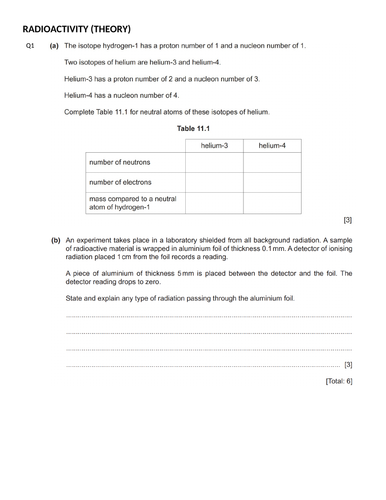

The worksheet includes 44 Theory Questions with answers
- Describe the structure of an atom in terms of a positive nucleus and negative electrons
- Describe how the scattering of α-particles by thin metal foils provides evidence for the nuclear atom
- Describe how the scattering of α-particles by thin metal foils provides evidence for the nuclear atom
- State the meaning of nuclear fission and nuclear fusion
- Balance equations involving nuclide notation
- Demonstrate understanding of background radiation
• Describe the detection of α-particles, β-particles and γ-rays (β+
are not included: β-particles will be taken to refer to β–)
Discuss the random nature of radioactive emission
• Identify α-, β- and γ-emissions by recalling
– their nature
– their relative ionising effects
– their relative penetrating abilities
(β+ are not included, β-particles will be takento refer to β–)
Describe their deflection in electric fields and in magnetic fields
• Interpret their relative ionising effects
• Give and explain examples of practical applications of α-, β- and γ-emissions
State the meaning of radioactive decay
• State that during α- or β-decay the nucleus changes to that of a different element
Use equations involving nuclide notation to represent changes in the composition of the nucleus when particles are emitted
Use the term half-life in simple calculations, which might involve information in tables or decay curves
Calculate half-life from data or decay curves from which background radiation has not been subtracted****
Recall the effects of ionising radiations on livingthings
• Describe how radioactive materials are handled,used and stored in a safe way
Something went wrong, please try again later.
This resource hasn't been reviewed yet
To ensure quality for our reviews, only customers who have downloaded this resource can review it
Report this resourceto let us know if it violates our terms and conditions.
Our customer service team will review your report and will be in touch.
£0.00
